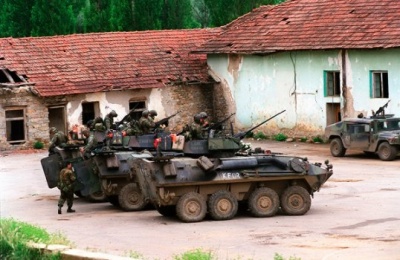Difference between revisions of "Conflict in Kosovo"
(Created page with "=== 1999 === 400px|thumbnail|left In 1998, nine years after Yugoslav President, Slobodan Milosevic, revoked Kosovo?s political autonomy, the Kosovo Liberatio...") |
|||
| Line 1: | Line 1: | ||
=== 1999 === | === 1999 === | ||
[[File:1999.jpg|400px|thumbnail|left]] | [[File:1999.jpg|400px|thumbnail|left]] | ||
| − | In 1998, nine years after Yugoslav President, Slobodan Milosevic, revoked Kosovo?s political autonomy, the Kosovo Liberation Army (KLA), came out in an open rebellion against Serbian rule. Their campaign against the Yugoslavian security forces, which was supported by the majority of ethnic Albanians, culminated in the Racak Massacre of January 15, 1999, in which 45 Kosovo Albanians, including women, children and elderly men, were killed in the village of Racak. The Western countries and the United Nations Security Council immediately condemned the incident as a massacre. The response to the crisis took the form of threats of military action by the West, and culminated in NATO air strikes against Yugoslavia in March, 1999. On 3 June of the same year, Milosevic capitulated and accepted peace conditions, and a NATO | + | In 1998, nine years after Yugoslav President, Slobodan Milosevic, revoked Kosovo?s political autonomy, the Kosovo Liberation Army (KLA), came out in an open rebellion against Serbian rule. Their campaign against the Yugoslavian security forces, which was supported by the majority of ethnic Albanians, culminated in the Racak Massacre of January 15, 1999, in which 45 Kosovo Albanians, including women, children and elderly men, were killed in the village of Racak. The Western countries and the United Nations Security Council immediately condemned the incident as a massacre. The response to the crisis took the form of threats of military action by the West, and culminated in NATO air strikes against Yugoslavia in March, 1999. On 3 June of the same year, Milosevic capitulated and accepted peace conditions, and a NATO [[Peacekeeping|peacekeepin]]g force entered Kosovo on 12 June, 1999. |
[[Category:Peacebuilding and Reconciliation]] | [[Category:Peacebuilding and Reconciliation]] | ||
Latest revision as of 09:38, 1 April 2014
1999[edit]
In 1998, nine years after Yugoslav President, Slobodan Milosevic, revoked Kosovo?s political autonomy, the Kosovo Liberation Army (KLA), came out in an open rebellion against Serbian rule. Their campaign against the Yugoslavian security forces, which was supported by the majority of ethnic Albanians, culminated in the Racak Massacre of January 15, 1999, in which 45 Kosovo Albanians, including women, children and elderly men, were killed in the village of Racak. The Western countries and the United Nations Security Council immediately condemned the incident as a massacre. The response to the crisis took the form of threats of military action by the West, and culminated in NATO air strikes against Yugoslavia in March, 1999. On 3 June of the same year, Milosevic capitulated and accepted peace conditions, and a NATO peacekeeping force entered Kosovo on 12 June, 1999.
